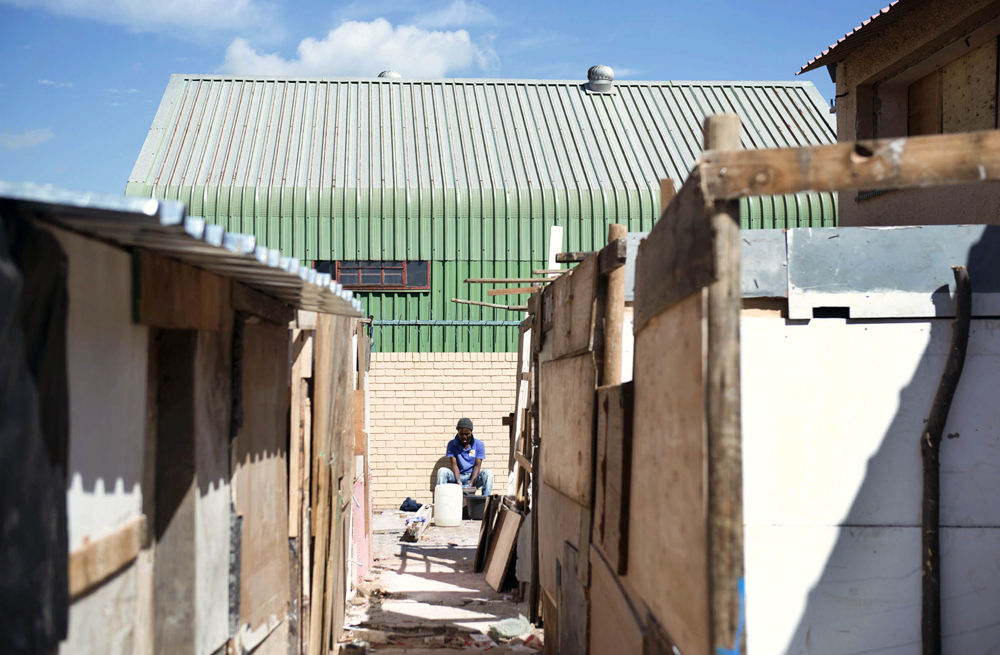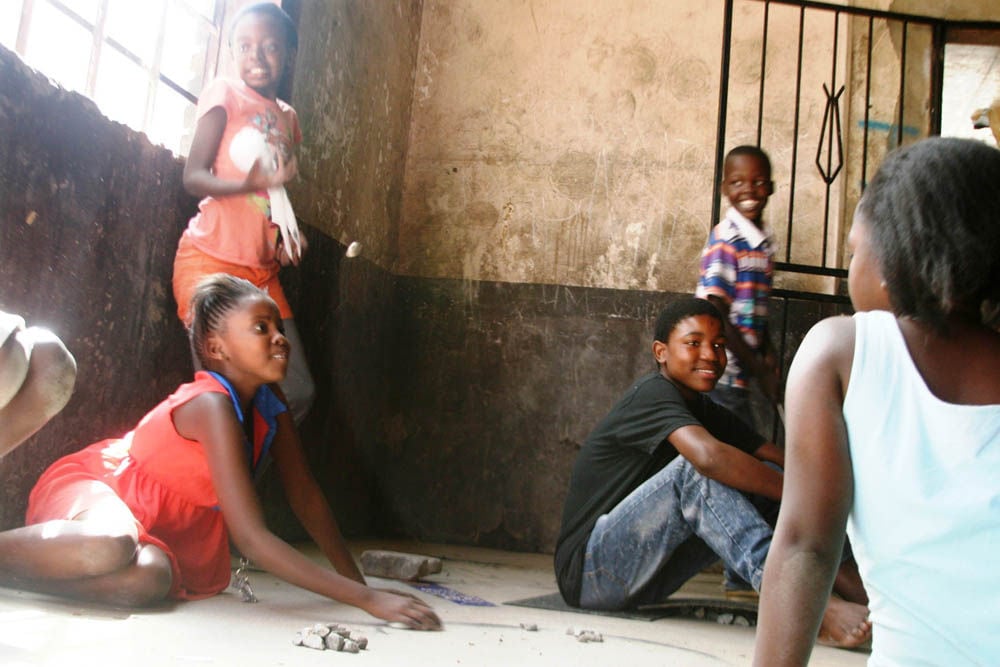Closed factories have been turned into informal settlements that shelter many families. Most unemployed people spend their days searching for work in vain.
The people on the factory floor are jobless. Just a fleeting memory ago, the able-bodied men and women cramming these factories would have been at work, hoping for remuneration.
Nowadays the people here call these factories "home". Many spend their time idle, with nothing to occupy them except watching the sun rise and set. Yesterday, today, tomorrow; it's all the same – no work.
This is Marlboro. It was once a thriving industrial area north of Sandton, Johannesburg, where many folks of the sprawling neighbouring Alexandra township used to earn a living.
Inside the warehouses now, the desperate and the poor have erected rickety shacks where they live in what at first glance might appear to be a normal family order – children leave for school in the morning as a dog tips over a dustbin in search of a scrap of food – but on a closer look the similarities soon give way.
Even taxis that would be plying the routes at a profit anywhere else just stutter around here, with no fares to pick up.
Provincial immigrants
Many of "the people of the factories" are from outside Johannesburg, from other provinces. Here and there one bumps into a Mozambican, already assimilated. The elementary isiZulu they speak gives them away to the streetwise locals.
Pontsho Hamise (32) is fit as a fiddle, ready for work. But his life has been reduced to whiling away time in a boring game of cards with his buddies. He is from Mokomeng gaRamokgopa, a village outside Polokwane in Limpopo.
"I came here in 2005," he says. He took a job at a poultry factory in nearby Linbro Park where he stayed for a year. "The working hours were abnormal," he says. "There was such a lot of work that you'd not finish all you had to do in one shift. But even when you stayed over for the extra hours, you'd not be paid for the overtime."

Marlboro resident Peter Yezani washes his clothes.
The owner was a slave driver who did not make things any easier for his workers, Hamise recalls. He left and has not been able to find other work since. "I live on piece jobs."
Before he took to standing at the pick-up points at street corners, he used to frequent a place where the job hunters threw their identity documents into a bin; prospective employers would raffle them out. "That has stopped. The whites who come there now identify their preferred labourers by name. If you're not known, you stand no chance."
Forlorn stories
At home in the Marlboro factories, almost every man has a similarly forlorn story to tell.
Hamise shares his little hovel with his common-law wife, Yvonne Morukhu (29).
They have two children, one at school in Alexandra, for whom they have to pay a monthly transport fee; the other is at pre-school.
There's a narrow passage that leads to their home. The padlocks on the other doors tell of owners who are out job hunting, says Hamise.
The story is always the same upon their return, he says: No luck.
His own room is a claustrophobic cubicle dominated by the bed. The children obviously have to contend with the elements on the bare floor. The roof leaks. There is a pungent smell of paraffin: "We use it to cook; there's no electricity here."
Illegal power connection
The electricity they had was connected illegally, Hamise reveals. They own a fridge, which has now become a grocery cabinet because there's no electricity any more.
Morukhu is a beautiful young woman, but she has the furrowed look of someone who has seen hope fade.
"Of course I'm looking for a job, how can I not," she responds when asked. It is not with bitterness or insolence – this is just how fate has altered her tone.
Every R200 that Hamise makes from his odd jobs – if they come – is already accounted for. It is a pity these jobs are few and far between. Mealie meal and paraffin are priorities, they agree. At R14 a litre, paraffin is a bit steep. The child grants help to pay for the transport money and lunchboxes.

Children play in a disused factory in Marlboro, Johannesburg.
(Photos: Oupa Nkosi and Jacob Mawela)
Nkosinathi Ndlovu is one of the lucky few. He is a self-taught car mechanic. "What I make is not enough but at least the children do not go to bed hungry," he says, fiddling with a beat-up Ford Sierra.
His "garage" is on the same factory floor that doubles as the playground of 14-year-olds Luphe Zuma and Ashely Molepo and their friends.
Wasted water
Outside, the women are hard at work, doing the washing. The communal taps have running water but it would appear no one thinks it is their duty to stop the dripping; some of the taps just don't close.
A posse of men standing listlessly at street corners is a common sight here. The women, if they are not doing the washing, have found their version of card games – plaiting one another's hair.
Zipho Makinana looks bored out of her wits. The last time she had a job was cleaning the streets in Midrand, "a long time ago".
The only time she's not out searching – no, begging – for a job is on Fridays: "It is pointless on a Friday because people are paid on the day and some go off early.
"My three children are not here with me; they are back in Mthatha with my mother. I have nothing to feed them here." She lives at the mercy of a boyfriend, a married man "who has to fend for his family first then think of me from what is left of his money". In the meantime she listens to the "radio all day".
'I don't know'
Boneka Matshaya is 23. She once worked a two-day week at a catering company in Kramerville. She's in Marlboro with two sisters. The highlight of the day is raising R5 to buy chicken innards they eat with pap.
Their mate Sibahle Mbusi is only 20. No one her age should be without prospects in life like this.
She just shrugs her shoulders when asked about tomorrow. Two days is just too far into the future for her to account for. "I really don't know," she sighs. This is her stock answer.
Those who put the national unemployment figure at 24.7% may have terribly miscalculated.
The factory people of Marlboro paint a picture of a bigger number, perhaps a bigger cost. – © makatilemedia
Unemployment: The spanner in SA's work
The latest labour market dynamics report released by Statistics South Africa (StatsSA) this week shows that life is worst as an unemployed, young black person.
At 24.7%, the overall unemployment rate improved by 0.2% percent from 2012 to 2013, as the economy scrapes its way back to the 22.5% unemployment rate of 2008, before the global economic recession hit.
Although 93% of people who have jobs managed to hang on to them over the past year, only 13% of those without jobs managed to find one. Although a job in the informal sector is the best way to enter the formal sector, it is also the area where job security is the most precarious.
The rate of unemployment among black people has declined for a second successive year. The rate of unemployed women decreased faster than for any other group.
Youth are still the hardest hit, with unemployment in this sector at an official 35% – even though they make up 56% of the working age population.
They also makes up two-thirds of the people who are not economically active at all.
If young people do manage to get a job, they are likely to end up on a contract for a limited duration. They are also less likely to get benefits such as medical aid and pension contributions.
South Africa's unemployment rate is the highest among all emerging-market economies. – Sipho Kings